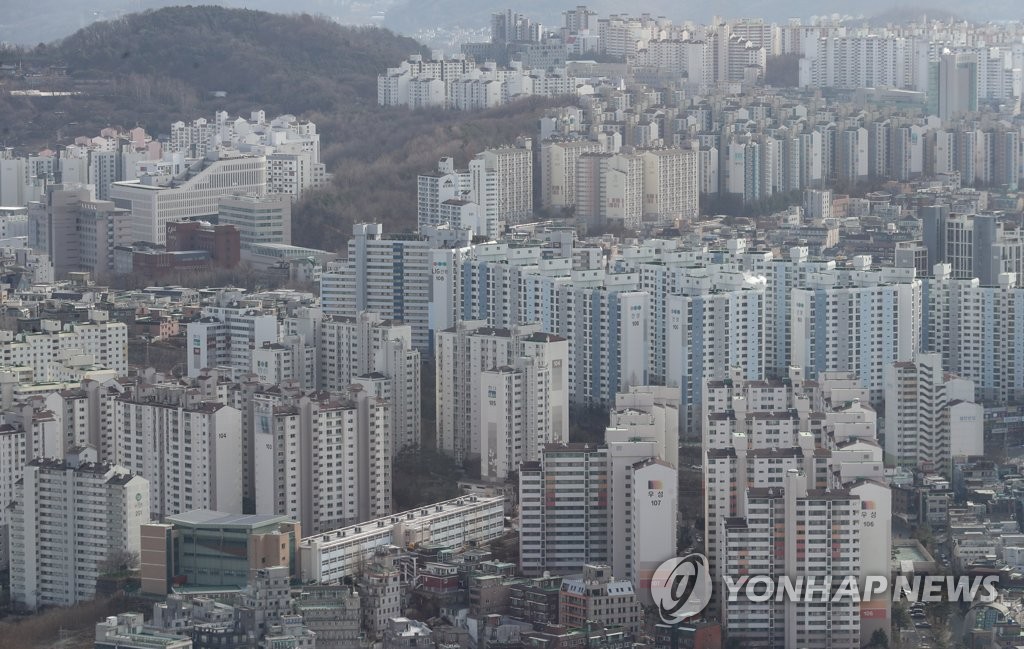The ruling party’s theory of easing the soaring house prices amid lockdown

(Seoul = Yonhap News) Reporter Kim Jong-hyun = The government has poured out measures to stabilize the real estate market 24 times, but even this year, house prices remain unchanged. The market is moving in the opposite direction of the government’s thoughts, regardless of whether the policy is to curb demand or expand supply.
According to the Korea Real Estate Agency, the nationwide apartment sale price rose 0.27% in the first week of January (as of the 4th). Apartment prices in the metropolitan area rose 0.26% and 0.28% in rural areas. The nationwide apartment rental price jumped 0.26%, continuing the upward trend for 80 consecutive weeks.
Now, the hill to lean on is the breakthrough of last year’s July 10 measures, which the Ministry of Land, Infrastructure and Transport Minister Byeon Chang-heum proposed before the Lunar New Year and the government believed it was the card to reverse the market trend. The market criticized the countermeasure that punitive tax was imposed on multi-homed people to induce sales before June, and the market criticized it for fueling a rise in home prices by blocking the retreat of multi-homed people, but the government expects that the sale could not overcome the tax fear. do.
◇ The government’s anticipation for the sale of multi-homed people that never cool
Through the real estate supplementary measures announced on July 10 last year, the government has decided to significantly strengthen the tax burden for multi-homeowners in all stages of acquisition, possession, and transfer, and apply this from June 1st.
The acquisition tax rate was raised to 8% for those with two homes and 12% for three or more homeowners. The comprehensive real estate tax was raised to a maximum of 6%, although the previous highest tax rate was 3.2%. The heavy tax rate, which is applied when multi-homeowners sell their houses in the area subject to adjustment, was increased by 10% points higher than before, so that for two houses, 20% points, and for three houses, 30% points. Accordingly, the highest transfer tax rate has risen to 62% for 2 homeowners and 72% for 3 or more homeowners.
Deputy Prime Minister Hong Nam-ki attended the entire meeting of the National Assembly’s Planning and Finance Committee on August 20 last year and said, “I expect a large portion of the sale of multi-homeowners to come out before the heavy transfer income tax is applied, and the sale is actually coming out.”
However, with the implementation of the new lease law in August of last year, the price of leased apartments soared, pushing up the price of existing apartments, and multi-homed people watched the trend and chose to donate to their children instead of transferring. According to the Korea Real Estate Agency, from January to November last year, the number of home donations nationwide was 134,000, the highest ever.
However, the government is still holding on to expectations. When the tax burden is imminent, psychological pressure can lead to multi-homed people throwing their property.
Deputy Prime Minister Hong appeared on the KBS Sunday Diagnosis on the 10th and said, “There are two measures to supply real estate last year, one was to supply new homes that took 3 to 5 years, and the other was to induce multi-homed people to sell their products by strengthening the tax system.” Said. He said, “If last year’s tax and supply measures are steadily implemented in the field, real estate prices will stabilize this year.”
![[그래픽] Average apartment sales price per square meter in Seoul](https://i0.wp.com/img2.yna.co.kr/etc/graphic/YH/2021/01/03/GYH2021010300170004400_P4.jpg?w=560&ssl=1)
◇ The market is skeptical… The ruling party’s theory of easing transfer tax
In the market, however, they are skeptical of the sale of multi-homed people. It is said that multi-homed people who have not yet sold their products have started to withstand as the current house prices are rising based on abundant liquidity despite the government’s lending deterrence measures.
Young-jin Ham, head of Jikbang’s Big Data Lab, said, “There is a lot of liquidity amid ultra-low interest rates, and there is still anxiety in the jeonse market, and the expectation for a smart house is still a difficult environment for multi-homed people to sell.”
He predicted, “If it is judged that the price of the house is higher than the tax, it is more likely that the multi-homed people will withstand the sale rather than offering it,” he predicted. “Some multi-homed sale may come out during the high season of moving this spring, but it will not be enough to change the trend of the market.” .
Ahn Myung-sook, head of the Real Estate Investment Support Center of Woori Bank, said, “To change the current market situation, interest rates must be raised, but this will not be possible at this stage.” I think I’m watching.”
In the market, there are many opinions that in order to stabilize the market by resolving the extreme lockdown and to reduce the rent to cheonsei, it is necessary to lighten the movement of multi-homed people by easing the transfer tax. As the situation circulates, some of the Democratic Party of Korea pushed forward the strengthening of the holding tax, but suggested that the burden of the transfer tax should be reduced to open the retreat for multi-homed people, thereby promoting market stability.
However, it seems difficult to make a choice because it overturns the government’s existing policy not to recognize unearned real estate income and speculative multi-household ownership in terms of market discipline.
Unauthorized reproduction-redistribution prohibited>
2021/01/11 05:00 sent
